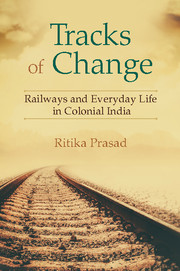Book contents
- Frontmatter
- Dedication
- Contents
- List of Tables and Figures
- Acknowledgements
- List of Abbreviations
- Introduction
- 1 The Nature of the Beast? An Elementary Logic for Third-Class Travel
- 2 Demand and Supply? Railway Space and Social Taxonomy
- 3 Crime and Punishment: In the Shadow of Railway Embankments
- 4 Railway Time: Speed, Synchronization, and ‘Time-Sense’
- 5 Contagion and Control: Managing Disease, Epidemics, and Mobility
- 6 Designing Rule: Power, Efficiency, and Anxiety
- 7 Marking Citizen from Denizen: Dissent, ‘Rogues,’ and Rupture
- Conclusion
- Bibliography
- Index
- About the Author
2 - Demand and Supply? Railway Space and Social Taxonomy
Published online by Cambridge University Press: 05 September 2015
- Frontmatter
- Dedication
- Contents
- List of Tables and Figures
- Acknowledgements
- List of Abbreviations
- Introduction
- 1 The Nature of the Beast? An Elementary Logic for Third-Class Travel
- 2 Demand and Supply? Railway Space and Social Taxonomy
- 3 Crime and Punishment: In the Shadow of Railway Embankments
- 4 Railway Time: Speed, Synchronization, and ‘Time-Sense’
- 5 Contagion and Control: Managing Disease, Epidemics, and Mobility
- 6 Designing Rule: Power, Efficiency, and Anxiety
- 7 Marking Citizen from Denizen: Dissent, ‘Rogues,’ and Rupture
- Conclusion
- Bibliography
- Index
- About the Author
Summary
In 1873, the editor of the Ahmedabad Samachar filed a complaint against the Bombay, Baroda, and Central Indian Railway (BBCI) for making him share a third-class railway carriage with a sweeper. Branding the complaint as one based upon ‘a vain superstition of the Hindoo religion,’ Ahmedabad's small cause court referred the case to the Bombay High Court, which dismissed it. About 35 years later, in 1911, Mathradas Ramchand, a pleader travelling from Karachi to Hyderabad on the North-Western Railway (NWR) also lost a legal battle. This time, it was Mathradas who challenged the railway's right to segregate paying passengers by delimiting certain second-class carriages as ‘Europeans only.’ The judicial commissioner of Sind disagreed with his claim and instead upheld the railway's right to exclude Indians from any carriage marked ‘Europeans only.’ A decade later, in 1921, Venkataramana Ayyangar faced an even more perplexing situation. He described to members of the Madras Legislative Council how his motor-driver Jnanamuttu had failed to procure him a retiring room at Erode station—until he decided to don a hat and give his name as John Matthew. Then, the station-master acquiesced.
As these incidents suggest, railway space spurred public conversations about contact and access, rights and privileges, and inclusion and exclusion. On the one hand, the everyday routines of railway travel engendered a series of shared experiences among colonial India's vast body of passengers (Chapter 1). On the other hand, train compartments and carriages, waiting and retiring rooms at stations, refreshment rooms, and dining cars were everyday spaces in which strangers found themselves in unprecedented situations of proximity. The ensuing conversations about distinction, difference, and distance—invoking (and combining) arguments of class, rank, race, or gender—resulted in negotiations that ranged from public protestations to litigious conflict. Caste status, socio-religious taboos on contact, and arguments of respectability and hygiene were amalgamated to counter the possibilities of physical proximity, especially in overcrowded spaces.
- Type
- Chapter
- Information
- Tracks of ChangeRailways and Everyday Life in Colonial India, pp. 58 - 98Publisher: Cambridge University PressPrint publication year: 2015



